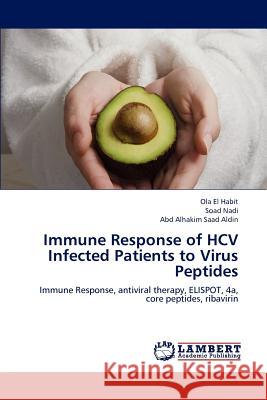Immune Response of HCV Infected Patients to Virus Peptides » książka
Immune Response of HCV Infected Patients to Virus Peptides
ISBN-13: 9783848447350 / Angielski / Miękka / 2012 / 320 str.
Infection with hepatitis C virus is a serious worldwide problem which may lead to cirrhosis and hepatocellular carcinoma. The prevalence of HCV in Egypt is very high (about 20 % of the population). The only available treatment for HCV is the alpha interferon in combination with the guanosine analogue ribavirin. The immune response to this virus is insufficient in most infected individuals, thus the majority of whom develop chronic liver disease with viral persistence despite the presence of HCV-antibodies and cellular immune responses. Differences in the host cellular immune response to HCV may be important in viral clearance. The cellular immune response plays a major role in HCV infection and could represent an attractive target for therapeutic intervention.
Infection with hepatitis C virus is a serious worldwide problem which may lead to cirrhosis and hepatocellular carcinoma. The prevalence of HCV in Egypt is very high (about 20 % of the population). The only available treatment for HCV is the alpha interferon in combination with the guanosine analogue ribavirin. The immune response to this virus is insufficient in most infected individuals, thus the majority of whom develop chronic liver disease with viral persistence despite the presence of HCV-antibodies and cellular immune responses. Differences in the host cellular immune response to HCV may be important in viral clearance. The cellular immune response plays a major role in HCV infection and could represent an attractive target for therapeutic intervention.











